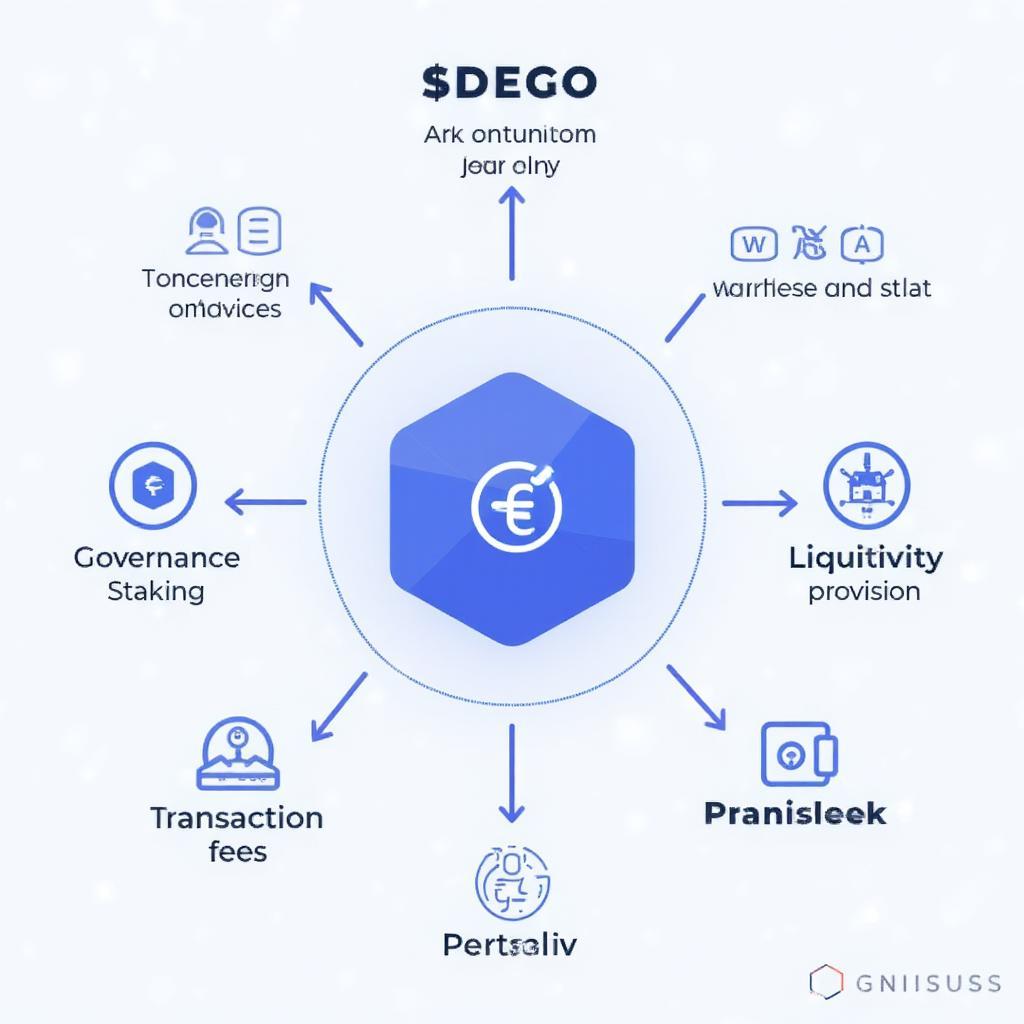Understanding Cryptocurrency: A Comprehensive Guide for Beginners and Beyond

Cryptocurrency, a term once confined to tech circles, has now entered mainstream conversation. But what exactly is it, and how does it all work? This guide aims to demystify cryptocurrency, providing a comprehensive overview for newcomers and valuable insights for those already familiar with the space. Understanding Cryptocurrency is crucial in today’s financial landscape, offering opportunities and risks that everyone should be aware of.
Cryptocurrencies are digital or virtual currencies secured by cryptography, making them nearly impossible to counterfeit or double-spend. Unlike traditional currencies issued by central banks, cryptocurrencies operate on decentralized technology, most notably blockchain. This means that control and validation of transactions are distributed among a network of computers, rather than a single authority. The core concept is that of a shared, transparent ledger, recording every transaction permanently. This revolutionary concept is now the backbone of a huge financial and technological movement.
The Fundamentals of Cryptocurrency
Let’s delve into the core aspects of understanding cryptocurrency. It’s not as intimidating as it might seem!
- Decentralization: As mentioned, this is a key differentiator. Cryptocurrencies aren’t controlled by any single entity, enhancing security and autonomy. The implications of such decentralization are profound and are still being understood.
- Blockchain Technology: The underlying technology of many cryptocurrencies is blockchain, a public ledger of transactions. Each block is linked to the previous one, forming a chain of records. This is a game-changer for data security and transparency.
- Cryptography: Cryptographic techniques secure transactions and control the creation of new units. These complex mathematical algorithms protect the integrity of the system from tampering.
- Wallets: These are software or hardware devices that hold the private keys needed to access and spend your cryptocurrency. There are various types, each with different trade-offs in security and convenience.
- Mining: The process of validating transactions on a blockchain and creating new cryptocurrencies (in some cases). It involves complex computations, contributing to the overall security of the network. Not all cryptos use mining.
- Exchanges: These are platforms where you can buy, sell, or trade cryptocurrencies. They’re essential for interacting within the market. Learn more about exchanges, such as kucoin twitter, where many traders monitor real time information and announcements.
Why Are Cryptocurrencies Important?
Understanding cryptocurrency isn’t just about personal investment; it’s about grasping a fundamental shift in finance. Cryptocurrencies offer several benefits:
- Financial Inclusion: They can reach those without access to traditional banking systems, allowing for global participation.
- Lower Transaction Fees: Often cheaper than conventional banking, especially for international transactions.
- Transparency: Blockchain technology makes transactions auditable and transparent.
- Faster Transactions: Cross-border payments are typically faster than through traditional methods.
- Potential Investment Opportunities: The price of cryptocurrencies has been volatile but also offers the potential for returns.
“Cryptocurrency represents a paradigm shift in how we think about money,” says Dr. Evelyn Reed, a financial technology expert. “Its potential impact is enormous, from global commerce to financial accessibility.”
Navigating the Risks of Cryptocurrency
While the appeal of cryptocurrencies is strong, it’s crucial to be aware of the risks.
- Volatility: Cryptocurrency prices are highly volatile, leading to potential losses.
- Security Risks: Despite the advanced technology, exchanges and wallets can be vulnerable to hacking and fraud.
- Lack of Regulation: The regulatory landscape for cryptocurrency is still evolving, creating uncertainty.
- Complexity: Understanding the technology can be challenging for beginners.
- Scams: The crypto space is prone to scams, so education is vital.
Types of Cryptocurrencies
There is a huge number of cryptos available, but they can be broadly classified into a few categories:
- Bitcoin (BTC): The original cryptocurrency, often viewed as “digital gold”. It was the first to demonstrate the concept of decentralized, peer-to-peer digital currency.
- Altcoins: All other cryptocurrencies other than Bitcoin. These include Ethereum, Cardano, and many others, each with its specific function and technology.
- Stablecoins: Cryptocurrencies designed to maintain a stable value, often pegged to fiat currencies like the US dollar. They are used to reduce price volatility.
- Utility Tokens: These offer access to a particular product or service within a cryptocurrency ecosystem. They are often used to pay for services.
- Security Tokens: These represent ownership in a traditional asset, like a stock or bond, but are traded on the blockchain.
Choosing the Right Cryptocurrency for You
Choosing a cryptocurrency depends on your specific goals and risk tolerance.
- Research: Start with the basics of what it is and its intended purpose. Understand the fundamentals before you commit.
- Consider your investment goals: Are you looking for long-term growth, short-term gains, or something else?
- Understand the technology: Spend time researching the underlying technology and value proposition.
- Assess risk: Understand the risks involved with each cryptocurrency. Higher potential returns often come with higher risks.
- Diversify: Consider not putting all your eggs in one basket and diversify your crypto portfolio.
- Use a secure wallet: Protect your cryptocurrency using secure wallets, and do your research to choose the right one for you.
- Use reputable exchanges: Find a reputable crypto exchange to buy and sell.
“Before investing in any cryptocurrency, it’s essential to conduct thorough research and understand the associated risks,” says John Chen, a leading crypto analyst. “It’s not just about chasing the hype; it’s about understanding the fundamentals.”
How to Get Started with Cryptocurrency
Want to jump into the crypto world? Here are some basic steps for understanding cryptocurrency and getting started:
- Education: Educate yourself on the fundamentals of blockchain, cryptocurrencies, and related technologies.
- Set up a wallet: Choose a secure wallet to store your crypto. Consider both software and hardware options.
- Choose an Exchange: Pick a reputable exchange that allows you to buy and sell crypto.
- Start with a small amount: Begin with a small amount that you can afford to lose. This will help you get familiar with the process without risking too much money upfront.
- Learn about trading: Understanding the fundamentals of the trading will help you to make better decisions.
- Stay informed: Follow reliable sources of information, including news outlets, forums, and blogs, but critically assess any information.
- Be Patient: Don’t expect to get rich quick; the market is volatile, so patience is key.

Advanced Concepts in Cryptocurrency
Understanding cryptocurrency goes beyond the basics. Here are some advanced concepts:
- Smart Contracts: Self-executing contracts on the blockchain that automatically enforce the terms of an agreement. They are used extensively in decentralized finance (DeFi).
- Decentralized Finance (DeFi): A blockchain-based financial system that doesn’t rely on intermediaries like banks or brokers. It operates through smart contracts.
- Non-Fungible Tokens (NFTs): Unique digital assets that represent ownership of a specific item or piece of content. They are often used in art, gaming, and collectibles.
- Layer-2 Scaling Solutions: Technologies that are designed to increase transaction speeds and reduce costs on a blockchain. They help to make blockchains more scalable.
For those who want to stay up to date with upcoming events, make sure you always check the coinmarket cal. Keeping track of these events will help you stay one step ahead.
The Future of Cryptocurrency
The future of cryptocurrency is still unfolding, but several trends suggest its continued growth and adoption:
- Increased Institutional Investment: Large institutions are increasingly allocating resources to cryptocurrency, signaling further integration into the mainstream.
- Regulatory clarity: Governments are starting to create rules for the cryptocurrency market, which will help to stabilize the industry and add legitimacy.
- Technological advancements: New innovations in blockchain technology and cryptocurrencies are rapidly being developed.
- Integration into traditional finance: We can expect to see more integration of crypto into the traditional finance system.
- Global Adoption: Cryptocurrency adoption is increasing globally, especially in areas with limited traditional banking systems.
“The impact of cryptocurrency is not limited to finance; it will revolutionize various sectors,” notes Sarah Kim, a tech analyst specializing in blockchain technology. “We’re only scratching the surface of its potential.”
Conclusion
Understanding cryptocurrency is no longer optional for those who wish to engage in the modern financial and technological landscape. While there are risks, the potential benefits of cryptocurrencies are substantial. By understanding the fundamentals, staying informed, and making responsible decisions, individuals can navigate the crypto world with confidence. Cryptocurrency is an evolving field, so continuous learning is essential for anyone looking to truly understand its implications and opportunities. This knowledge will help you navigate and make the best decisions for your own financial journey.
FAQ
Here are some frequently asked questions about cryptocurrency:
- What is the difference between a cryptocurrency and a fiat currency? Fiat currencies are issued by governments and central banks, while cryptocurrencies are decentralized and often operate on blockchain technology.
- Is cryptocurrency legal? The legality of cryptocurrency varies by country. While generally not considered illegal in most places, the regulations can be quite different.
- How do I buy cryptocurrency? You can buy cryptocurrency through a cryptocurrency exchange, using traditional payment methods.
- What is a cryptocurrency wallet? A cryptocurrency wallet stores your private keys, allowing you to access and control your cryptocurrency.
- What is blockchain technology? Blockchain is a public, decentralized ledger that records all transactions in a secure and transparent manner.
- Is cryptocurrency safe to invest in? Investing in cryptocurrency is risky due to high price volatility, and requires careful risk management.
- How do I protect my cryptocurrency? Use strong passwords, enable two-factor authentication, and consider using a hardware wallet for long-term storage.
- What is mining? Mining is the process of validating transactions on the blockchain and creating new cryptocurrencies, primarily used on blockchains that utilize Proof-of-Work.
- Are all cryptocurrencies the same? No, cryptocurrencies vary greatly in purpose, function, technology, and the problems they aim to solve.




